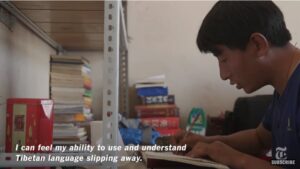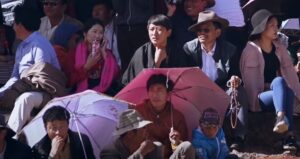
Tashi Wangchuk
Photo: screengrab from New York Times video
Tashi Wangchuk has been released from prison but is far from free. He is the Tibetan language activist who sparked international outcry when he was detained by the Chinese; he was released on January 28 after completing his five-year jail sentence. The news of his release reached Tibetans in exile and international right groups following a tweet by his lawyer, Liang Xiaojun. Tibetans and human right groups have expressed concerns about his health and say that, in effect, his sentence continues as he now faces a five-year deprivation of political rights and will not have the right to “free expression, association or publication.” In addition, he will be subjected to official surveillance and restriction.
Following his release, Tashi Wangchuk was taken to his sister’s family in Trindu County in Yushu, Qinghai. His lawyer, Liang, said that he was not able to directly contact Tashi and his family, nor has he seen a photo of him after his release, and cannot therefore say whether Tashi is “fully free”.
At no time has Tashi ever campaigned for independence for Tibet. He has only ever asked for Tibetans’ constitutional right to their own language to be honoured.
Officials of the European Union and the United States have responded to Tashi’s release:
“The European Union calls upon the Chinese authorities to ensure that Mr Wangchuk’s release is unconditional and that he is able to enjoy his fundamental freedoms, including freedom of movement and residence. The EU also urges the authorities to conduct a thorough investigation into allegations of mistreatment, torture and abuses on Mr Wangchuk while in detention.”
The EU also calls for the immediate and unconditional release of all current prisoners who are detained for exercising their fundamental human rights, and urged for a fair trial for all those in detention.
“We will be monitoring Tashi Wangchuk’s condition and call on [the] Chinese authorities to ensure that he is fully free from all post-release restrictions” said United States lawmakers in a joint statement that also expressed concern over Beijing’s language policies, Representative James McGovern and Senator Marco Rubio, co-chairs of the bipartisan and bicameral Congressional-Executive Commission on China (CECC), were speaking to Radio Free Asia (RFA).
 Tashi is about 35 years old. He was arrested in 2016 on the charges of “inciting separatism” after his appearance in a New York Times documentary where he spoke about his efforts towards the preservation of the Tibetan language. The documentary covered his journey from Tibet to Beijing to make a formal complaint about China’s restrictions on the right of Tibetans to be educated in their native Tibetan language. Following publication of the documentary and related articles by news agencies, Tashi was arrested in January 2016 and held in prison for two years without a court trail. In May 2018, he appeared in court to face charges of “inciting separatism” and was sentenced to five years.
Tashi is about 35 years old. He was arrested in 2016 on the charges of “inciting separatism” after his appearance in a New York Times documentary where he spoke about his efforts towards the preservation of the Tibetan language. The documentary covered his journey from Tibet to Beijing to make a formal complaint about China’s restrictions on the right of Tibetans to be educated in their native Tibetan language. Following publication of the documentary and related articles by news agencies, Tashi was arrested in January 2016 and held in prison for two years without a court trail. In May 2018, he appeared in court to face charges of “inciting separatism” and was sentenced to five years.
According to Free Tibet, a non-government Tibet support group based in London, Tashi suffered extreme inhuman treatment during the initial days of his detention. Free Tibet has stated that he was initially held for a lengthy period in a “tiger chair” where he was subjected to arduous interrogation and was repeatedly beaten. His interrogators also threatened to harm his family. He was denied the right to see his lawyer on multiple occasions.
While he was in prison, many international rights group and Tibetans in exile called for his release, protesting against Tashi’s arrest and imprisonment. His conviction and sentence were widely reported by the international media.
 China’s constitution and international human rights law guarantees the right to use and develop minority languages. “China describes the language policies for occupied Tibet as ‘bilingual education’, but with Tibetan-language schools being forced to close their doors and kindergarten aged children being forced to learn only in Chinese, it’s clear that this is a deliberate effort to strip Tibetans’ language and culture from them,” said Free Tibet in their report on Tashi’s release.
China’s constitution and international human rights law guarantees the right to use and develop minority languages. “China describes the language policies for occupied Tibet as ‘bilingual education’, but with Tibetan-language schools being forced to close their doors and kindergarten aged children being forced to learn only in Chinese, it’s clear that this is a deliberate effort to strip Tibetans’ language and culture from them,” said Free Tibet in their report on Tashi’s release.
“His imprisonment was an action that appeared intended to silence critics, impede the free flow of information, and ultimately deprive Chinese citizens of information,” said a New York Times spokesperson to RFA Tibetan service, applauding Tashi’s release.
Right groups have expressed fears and concerns about Tashi, given the general policies of the Beijing authorities and the documented treatment of former political prisoners.
“Today may mark the end of Tashi Wangchuk’s unjust imprisonment, but he remains unfree, with a further five years’ deprivation of political rights which will see his every action surveilled. Tashi’s only “crime” was to peacefully call for the right of Tibetans to learn in their own language […],” said Tenzin Tselha, an officer at the International Tibet Network
“We are thrilled with the news of Tashi’s release. […] It is an outrage that he was ever jailed in the first place, and it is further galling that he will now have his rights further curtailed and repressed. We vow to continue pushing for his freedom and call on governments to take joint action calling on authorities to immediately lift all restrictions on him,” said John Jones of Free Tibet
Sophie Richardson, China Director at New York-based Human Rights Watch said “it is clear that the Chinese government doesn’t want anybody reporting on Tibet, Xinjiang or other human rights violations.The international community must not only focus on defending people like Tashi Wangchuk and the importance of press freedom and freedom of expression, but they should focus on holding Chinese officials accountable who are responsible for these human rights violations.”
To watch the New York Times video click here




 Print
Print Email
Email